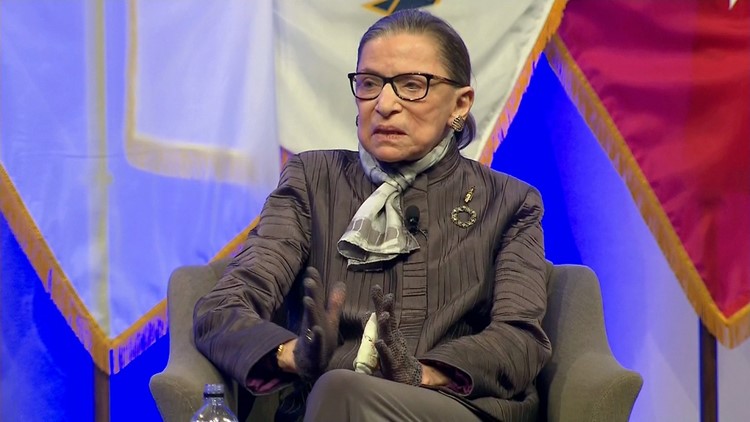LEXINGTON, Virginia — Justice Ruth Bader Ginsburg made a poignant visit to the Virginia Military Institute on Wednesday, her first trip to the state-funded school she profoundly changed some 20 years ago by striking down its all-male admissions policy.
In a talk before the school’s cadets, Ginsburg said she knew her opinion, which opened the doors to women, “would make VMI a better place” and thought that those who were initially opposed would learn from their women classmates “how much good women could do for the institution.”
Ginsburg explained that the gist of the opinion was simple. “There are women who are ready and willing and able to undergo the tough training at VMI and they want that opportunity,” she said.
The school now has 1,700 cadets in its student body, which includes about 194 women, according to Col. Stewart MacInnis, the director of communications for VMI.
Laura Tyler Chambers, a 2003 graduate, met with Ginsburg before the event and gave the 83-year-old justice her steel combat ring.
“I gave it to her to thank her for battling for us,” Chambers said.
Cadet Makayla Diamond, 20, from Virginia was in the audience to hear the speech. “I’m very thankful because without Ruth Bader Ginsburg I might not be here,” she said. “She allowed all these women to not only come here but to succeed in whatever they wanted to do.”
In the 1996 opinion, United States v. Virginia, Ginsburg wrote “generalizations about ‘the way women are,’ estimates of what is appropriate for most women, no longer justify denying opportunity to women whose talent and capacity place them outside the average description.”
During the talk, Ginsburg said she was wearing a “keydet” pin that the mothers of graduating cadets received in the ’60s. She said it had been sent to her from a man, who graduated in 1967, after his own mother died.
“He wrote to me that this pin was given to the mother of every man in the graduating class and when his mother died he thought I might like to have the pin — he thought she would be proud if I would wear it,” she said.
The impact of the ruling continues to be felt, both at the school and in the country at large.
“The majority opinion in the VMI case is perhaps the best-known and most important majority opinion Justice Ginsburg has penned in her 24 years on the Supreme Court,” said Steve Vladeck, CNN Supreme Court analyst and professor of law at the University of Texas School of Law. “That case, more than any other, epitomized the justices’ effort to establish true sex equality as a fundamental constitutional norm, and its effects are continuing to reverberate today.”
Scalia dissented
The late Justice Antonin Scalia was the sole dissenter.
“[T]he tradition of having government funded military schools for men is as well rooted in the traditions of this country as the tradition of sending only men into military combat,” Scalia wrote. “The people may decide to change the one tradition, like the other, through democratic processes; but the assertion that either tradition has been unconstitutional through the centuries is not law, but politics smuggled into law.”
Ginsburg and Scalia , although ideological opposites, were close personal friends. Ginsburg told the audience that as she was drafting her opinion Scalia stopped by her chambers to deliver a draft of dissent to give her time to respond to it in her majority opinion.
“The ultimate opinion was much better than the first draft because he picked up on all of the soft spots and enabled me to make it even stronger than it would have been absent his attention-grabbing dissent,” Ginsburg said to laughter.
Ginsburg — who, as a young lawyer, blazed trails on the issue of gender discrimination — also spoke about her own struggles as a woman during law school when there were so few other women in the class. “You felt you were constantly on display,” she said.
Her appearance came a day after President Donald Trump announced his new Supreme Court nominee, Judge Neil Gorsuch. Ginsburg was not asked about Gorsuch.
Court watchers wonder if Trump will get the chance at another vacancy on the court given the fact that she is 83 years old, Justice Stephen Breyer is 78 and Justice Anthony Kennedy is 80.



